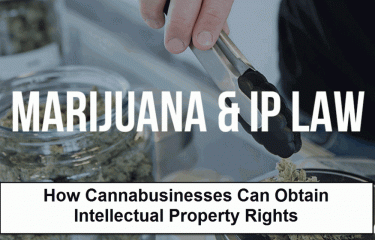
What’s the deal with registering a trademark in the marijuana industry?
You’ve probably read about the “Spotify” and “Potify” trademark case in which the US government ruled that they infringed the trademark of music streaming services. As a fast-growing industry with an expanding market, the cannabis industry needs solid and recognizable brands. Brand names hold power in every industry. The global cannabis industry thrives on differentiation and innovation. Companies in developed industries understand that “identity” is one of the most valuable assets a company can have. It is also the most prone to replication.
Cannabis entrepreneurs need a way to ensure their brand’s legality and differentiate themselves from both the competition and other counterfeit brands. Registering a brand’s trademark is the easiest way to monitor a product and prevent intellectual property theft when a business is thriving.
Brands in the US cannabis space
Newcomers to the industry are unaware that cannabis industry brands can be protected. This misunderstanding stems from the lack of federal cannabis reform. There are state and federal marks that can be applied for in jurisdictions. The United States Patent and Trademark Office (USPTO) has completed trademark processing for US Weed Channel, Cheech’s Private Stash, Got GUMMIES and Medmen.
As the availability, legality, and acceptance of cannabis and hemp products continue to increase, it is imperative that brands register their trademarks. This process is not as easy as it should be because of the federal stance on drugs. Therefore, registering trademarks requires deliberate action guided by sensible tactics. Marijuana patents fall into a slightly different legal category and registration process.
Purpose of Registering Trademarks
A brand is a unique identity that improves customer loyalty. Note that a trade name is not a trademark.
Registering a trademark gives the trademark a unique right to use an identity. You must be prepared to provide proof of use of the mark. You also need to ensure that consumers recognize and associate your products with the brand.
Registering trademarks in the cannabis industry is expensive, complicated and time-consuming. However, it is less costly than potential identity or intellectual property theft. Government trademarks are limited. This registration only grants exclusive rights to trademarks within a state. Common law rights are limited to each territory. For example, a trademark registered in California can be used in Oregon because there are no laws prohibiting the use of the same trademark across state lines. Currently, all state trademark registrations can only be processed for non-hemp cannabis products.
Federal trademark registration has fewer restrictions. Approved federal marks are exclusive to one mark throughout the country. The right to use the mark to sell legal goods and services is granted to the mark. Federal law prevents replicated marks from being trademarked. Offenders found guilty of this act will be fined or face statutory damages. Registering a federal trademark is more advisable because your trademark has reserved use of the mark for about three years. To renew a trademark with a federal agency, you must provide proof of use.
Federal Trademark Registration Restrictions for Cannabis Companies
Federally, hemp is a legal substance, but marijuana is not. This has led to significant discrimination in the evaluation of marks for trademarks.
Commercial use required
This requirement is mandatory evidence that all brands must demonstrate. It is requested once an application has been approved by the United States Patent and Trademark Office. Since the passage of the first state cannabis legislation, at least 8,000 trademark applications have been filed for cannabis-related goods and services. Of these applications, only 1,300 passed the registration phase. This is largely due to the federal ban on cannabis and its extracts.
The “commercial use” requirement shows the federal agency that the product for which a trademark is registered can be legally traded under federal law. In this case cannabis. Sales of products offered in lieu of this requirement do not count because it is not legal under federal law. Regardless of this limitation, having around 1,300 trademarked cannabis extract products is still a commendable achievement.
Eligible Goods
This is another criterion that ensures that all goods and services are legal under federal law. The USPTO automatically denies all applications for products containing cannabinoids and other cannabis extracts. This measure follows the Controlled Substances Act (CSA). The agency considers that all products processed with cannabis extracts, regardless of the amount, contain CBD and THC (both are banned cannabinoids).
The USPTO began processing applications for the use of hemp products in 2018. This happened shortly after the Agricultural Improvement Act, also known as the Farm Bill, was implemented in the same year. On this basis, hemp products with less than 0.3% THC can be trademarked. However, for an ingestible hemp product to be trademarked, it must first be approved by the Federal Drug Administration (FDA). A look at FDA records shows that only a few products containing CBD have been approved.
Always wise to keep evidence
Until state cannabis laws are passed, it is best to retain evidence for insurance purposes. Ensure your brand retains use of trademarked identity for sale. In this way, the registration cannot be contested with non-use claims. So far, the trademark is registered with the USPTO and the services are provided in a timely manner, eliminating the possibility of being accused of fraud even though the goods are illegal at the federal level.
Another way to hedge against unsubstantiated claims is to include a product that only contains hemp seed oil as the cannabis extract. Should federal agencies test the product, you can be assured that the product contains the standard amount of CBD or THC. You can also get certification from a third party to indicate that the ingredients used contain less than 0.3% THC.
bottom line
A trademark is an important branding asset for the name, logo, slogans, smells, colors, packaging, and even sounds of your cannabis goods or services. At this point, serious cannabis entrepreneurs should contact a trademark attorney to learn how to approach this process before the industry becomes too porous. Don’t forget, the more unique your brand is, the better!
TRADEMARKS AND WEED, READ MORE…

SUBWAY VS. BUDWAY – WHY NOT TO CHALLENGE BRANDS.
OR..

HOW TO PROTECT YOUR MARIJUANA IP WITH A PATENT!

Post a comment: